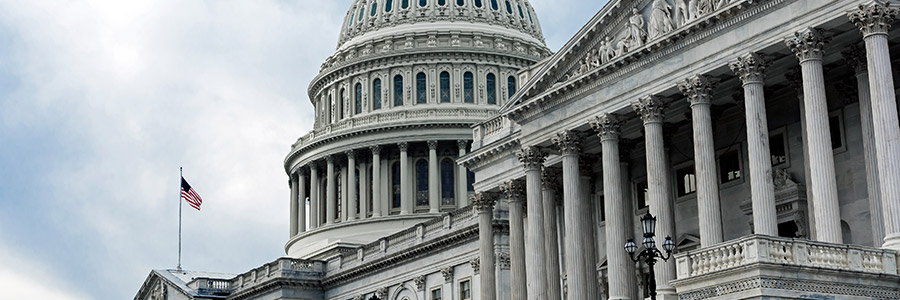The Economic Implications of a U.S. Presidential Rematch
By: Gennadiy Goldberg, Oscar Muñoz, Molly McGown
Jan. 30, 2024 - 5 minutes
And just like that, election season is upon us
The U.S. election season is once again upon us and the runoff is set to feature two eerily familiar candidates — the incumbent President Biden and the challenger, former President Trump, who appears widely favored to lock up the Republican nomination. Despite the market's relative certainty about a Biden/Trump rematch, both candidates have potential stumbling blocks on the road to their respective party nominations.
Primary season is already underway with Trump winning the Iowa and New Hampshire primaries. There are still a wide number of primaries remaining, but by Super Tuesday, the candidate for each side should effectively be locked in.
Selected key dates in the 2024 race
Who could win the 2024 U.S. presidential election?
The coming election cycle will likely be one of the most interesting in recent memory as a highly polarized electorate takes to the polls on November 5.
Our current baseline scenario is that Donald Trump could win the presidency in 2024 and that Republicans might recapture the Senate. Control of the House remains very close, but currently we expect the Senate and House may be under split control.
What will markets focus on?
Markets always have a difficult time pricing in elections. Slim control over the Senate or House could undermine the winning administration's ability to implement policy. Historically, investors tend to ignore political risks until the last moment. This was the case in the 2016 election when markets swung wildly following the election of President Trump with equities initially selling off but subsequently rallying on expectations of tax cuts and more pro-business policies.
Potential U.S. Political Scenarios and Expected Market Reactions
While markets may struggle to price in the election results, we believe they will be focused on the following:
Tax/growth implications:
Trump's promise to make the 2017 tax cuts permanent would likely avoid a 2026 fiscal cliff and remain supportive for growth, leaving the corporate tax rate at 21%. Biden aims to increase the corporate tax rate to 28% and to increase capital gains and dividends taxes for wealthy individuals. He intends to tax long-term capital gains at ordinary tax rates for incomes above $1mn, impose a minimum effective tax rate of 20% on households with net wealth above $100mn, and increase the top individual income tax rate to 39.6%. However, deficits are likely to stay elevated as spending is likely to remain high.
Deficit implications:
In the absence of cuts to spending, Trump making his 2017 tax cuts permanent could sharply increase deficits and may trigger another round of cuts to the U.S. credit rating. Biden's plan would increase taxes on upper-income households which may marginally lower deficits, but any decline in deficits will likely be offset by additional spending. Both Trump and Biden would likely need to cut spending to help reduce deficits, but with just 15% of government spending currently classified as discretionary ex-defense, there is little room for Congress to meaningfully improve the U.S. fiscal trajectory.
Regulatory implications:
The next administration will help steer the tone of key regulatory efforts. For markets, the Basel III endgame is likely to be key. A Biden re-election would provide regulators with sufficient time to finish the Basel III endgame regulations, increasing costs for banks. A Trump victory, on the other hand, would likely delay the endgame and likely lower its ultimate impact on banks. Note that Trump has said little about his regulatory stance, and in a recent report, our colleagues at the TD Cowen Washington Research Group suggest that his appointment for Treasury secretary will likely have wide latitude over such decisions.
Geopolitics still in focus:
The Biden administration has worked to stabilize US-China relations as military communications have resumed between the two countries. Still, tensions between China and Taiwan persist following the election of the Democratic Progressive Party's Lai Ching-te, potentially continuing to strain U.S.-China relations. Trump's relationship with China was also contentious and included multiple rounds of trade disputes leading to the implementation of new tariffs, suggesting more of the same if he is re-elected. Aid to Ukraine and Israel is also on the docket, with Biden supporting more aid while Republicans would likely look to slash spending.
Tariffs:
While Biden has maintained some of the policies and tariffs implemented by Trump, another Trump administration would likely see a further escalation of trade wars. Trump has proposed a 10% tariff on foreign goods to help boost U.S. manufacturing.
Deficits set to remain elevated, and election poses upside risks
Elections ultimately bring lots of moving parts for markets, but from a fundamental standpoint, we believe markets would be impacted in the following ways:
From a longer-term rate perspective, we view the fair value of 10y Treasuries at around 3.5%. However, a sharp upswing in deficits and softer economic landing could ultimately keep rates elevated. Near term, while higher deficits are a risk, are looking for rates to move lower in 2024 amid Fed rate cuts starting in May, with 10s ending the year at 3%.
Large deficits have historically been positively correlated with tighter swap spreads, as high issuance of Treasuries has typically left them trading cheaper relative to swaps. We generally expect swap spreads to trough in H1 and widen in H2 2024, but expectations of sustained higher deficits could slow any widening in spreads.
TD Securities clients can read our full note on the TD Securities Market Alpha portal where we address some of the key issues for both front-runners, discuss some possible stumbling blocks, and look into the potential policy implications of each candidate following the U.S. election.










